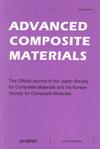Static analysis of shear-deformable aircraft wings using a multilayered functionally graded material model
IF 2.3
3区 材料科学
Q3 MATERIALS SCIENCE, COMPOSITES
引用次数: 0
Abstract
AbstractThis study presents a comprehensive investigation of the static analysis of a shear-deformable aircraft wing made of functionally graded materials (FGMs). A finite element-based multilayered FGM model is employed for this purpose. In order to ensure the safe structural design of the aircraft wing, it is crucial to analyze the transverse displacement of the wing under various loading conditions. The presented model employs a power-law distribution based on the rule of mixture to derive the effective material properties of the FGM wing. The analysis focuses on three standard FGM aircraft wing profiles, namely NACA 0009, NACA 2424, and NACA 4415, which are representative of commonly used geometries in aircraft design. Additionally, the study explores the effects of volume fraction index, loading conditions, boundary conditions, and aspect ratio on the static analysis of the shear-deformable FGM aircraft wing. These parameters play a significant role in shaping the static behavior of the wings and offer valuable insights into the design of FGM aircraft wings.Keywords: Static analysisFGM aircraft wingmultilayered FGM modelNACA airfoil profilesfinite element analysis AcknowledgementsThis work was supported by the National Research Foundation of Korea (NRF) grant funded by the Korea government (MSIT) (No. 2022R1F1A1069025). This research was supported by Basic Science Research Program through the National Research Foundation of Korea (NRF) funded by the Ministry of Education (grant number: 2022R1A6A1A03056784).Disclosure statementNo potential conflict of interest was reported by the authors.Data availability statementThe authors confirm that the data supporting the findings of this study are available within the article.Additional informationFundingThis work was supported by the National Research Foundation of Korea [2022R1F1A1069025]; National Research Foundation of Korea [2022R1A6A1A03056784].基于多层功能梯度材料模型的飞机机翼剪切变形静力分析
摘要本文对功能梯度材料(fgm)飞机剪切变形机翼的静力分析进行了全面的研究。为此,采用了基于有限元的多层FGM模型。为了保证飞机机翼结构设计的安全性,对机翼在各种载荷条件下的横向位移进行分析是至关重要的。该模型采用基于混合规律的幂律分布来推导FGM机翼的有效材料性能。分析的重点是三种标准的FGM飞机翼型,即NACA 0009、NACA 2424和NACA 4415,它们是飞机设计中常用的几何形状的代表。此外,研究了体积分数指数、加载条件、边界条件和展弦比对剪切变形FGM飞机机翼静力分析的影响。这些参数在机翼静态性能的形成中起着重要的作用,并为FGM飞机机翼的设计提供了有价值的见解。关键词:静力分析FGM飞机机翼多层FGM模型naca翼型轮廓有限元分析致谢本工作由韩国政府(MSIT)资助的韩国国家研究基金会(NRF)资助(No. 2022R1F1A1069025)。本研究由教育部国家研究基金基础科学研究计划资助(批准号:2022R1A6A1A03056784)。披露声明作者未报告潜在的利益冲突。数据可用性声明作者确认在文章中可以获得支持本研究结果的数据。本研究由韩国国家研究基金资助[2022R1F1A1069025];韩国国家研究基金[2022R1A6A1A03056784]。
本文章由计算机程序翻译,如有差异,请以英文原文为准。
求助全文
约1分钟内获得全文
求助全文
来源期刊

Advanced Composite Materials
工程技术-材料科学:复合
CiteScore
5.00
自引率
20.70%
发文量
54
审稿时长
3 months
期刊介绍:
"Advanced Composite Materials (ACM), a bi-monthly publication of the Japan Society for Composite Materials and the Korean Society for Composite Materials, provides an international forum for researchers, manufacturers and designers who are working in the field of composite materials and their structures. Issues contain articles on all aspects of current scientific and technological progress in this interdisciplinary field. The topics of interest are physical, chemical, mechanical and other properties of advanced composites as well as their constituent materials; experimental and theoretical studies relating microscopic to macroscopic behavior; testing and evaluation with emphasis on environmental effects and reliability; novel techniques of fabricating various types of composites and of forming structural components utilizing these materials; design and analysis for specific applications.
Advanced Composite Materials publishes refereed original research papers, review papers, technical papers and short notes as well as some translated papers originally published in the Journal of the Japan Society for Composite Materials. Issues also contain news items such as information on new materials and their processing."
 求助内容:
求助内容: 应助结果提醒方式:
应助结果提醒方式:


